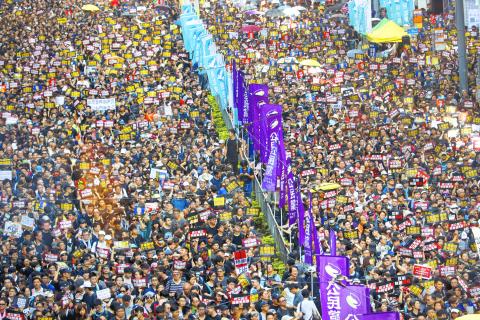Tens of thousands of Hong Kongers yesterday marched through the center of Hong Kong Island to the vicinity of government headquarters, ignoring a police-approved end point and defying a ruling that shortened the planned route.
The march marked the sixth straight week of anti-government rallies that have put increasing pressure on the Hong Kong government.
The organizer, the Civil Human Rights Front said that the rallies, which have drawn hundreds of thousands of people, were held to show support for demands including the withdrawal of legislation that would allow extraditions to China, amnesty for arrested protesters and the resignation of Hong Kong Chief Executive Carrie Lam (林鄭月娥), who is backed by Beijing.

Photo: AP
The Appeal Board on Public Meetings and Processions on Saturday ruled that the march, originally planned to end at the Court of Final Appeal in Central, must finish in the Wan Chai district, citing potential difficulties in crowd control.
However, marchers ignored the ruling, and police retreated and shifted their barricades to allow the mass of protesters past the Wan Chai end point.
Shopkeepers along the route supplied marchers with water and other drinks as the temperature in the territory hovered above 30°C.
Barricades surrounding the police station in Wan Chai were converted into so-called “Lennon Walls,” spontaneous message boards adorned with brightly colored sticky labels.
Pro-democracy lawmaker Claudia Mo (毛孟靜) said that protesters wanted Lam to pledge not to target people who took part in the rallies.
“We would like her to say that there will be no prosecution of the protesters arrested, that there will be general amnesty in this very sad saga,” Mo said.
“She refuses in the name of the rule of law,” she said.
Lam will not resign and will not make any further concessions to the protesters, Hong Kong Executive Council Convener Bernard Chan (陳智思) said in an interview with the New York Times published on Friday.
The chief executive would consult with different sectors of the Hong Kong population and would concentrate on drafting a broad policy address for the middle of October, the report quoted Chan as saying.
Kingston Cheung, a 17-year-old student who has taken part in the protests since they started on June 9, said he marched yesterday to voice opposition to the government’s handling of previous protests.
“The focus of the protests has been about the extradition bill, but we are also starting to see how the government and police have mishandled them,” he said. “The abuse of power by the police has added to the public’s anger.”

A magnitude 7.0 earthquake struck off Yilan at 11:05pm yesterday, the Central Weather Administration (CWA) said. The epicenter was located at sea, about 32.3km east of Yilan County Hall, at a depth of 72.8km, CWA data showed There were no immediate reports of damage. The intensity of the quake, which gauges the actual effect of a seismic event, measured 4 in Yilan County area on Taiwan’s seven-tier intensity scale, the data showed. It measured 4 in other parts of eastern, northern and central Taiwan as well as Tainan, and 3 in Kaohsiung and Pingtung County, and 2 in Lienchiang and Penghu counties and 1

FOREIGN INTERFERENCE: Beijing would likely intensify public opinion warfare in next year’s local elections to prevent Lai from getting re-elected, the ‘Yomiuri Shimbun’ said Internal documents from a Chinese artificial intelligence (AI) company indicated that China has been using the technology to intervene in foreign elections, including propaganda targeting Taiwan’s local elections next year and presidential elections in 2028, a Japanese newspaper reported yesterday. The Institute of National Security of Vanderbilt University obtained nearly 400 pages of documents from GoLaxy, a company with ties to the Chinese government, and found evidence that it had apparently deployed sophisticated, AI-driven propaganda campaigns in Hong Kong and Taiwan to shape public opinion, the Yomiuri Shimbun reported. GoLaxy provides insights, situation analysis and public opinion-shaping technology by conducting network surveillance

‘POLITICAL GAME’: DPP lawmakers said the motion would not meet the legislative threshold needed, and accused the KMT and the TPP of trivializing the Constitution The Legislative Yuan yesterday approved a motion to initiate impeachment proceedings against President William Lai (賴清德), saying he had undermined Taiwan’s constitutional order and democracy. The motion was approved 61-50 by lawmakers from the main opposition Chinese Nationalist Party (KMT) and the smaller Taiwan People’s Party (TPP), who together hold a legislative majority. Under the motion, a roll call vote for impeachment would be held on May 19 next year, after various hearings are held and Lai is given the chance to defend himself. The move came after Lai on Monday last week did not promulgate an amendment passed by the legislature that

AFTERMATH: The Taipei City Government said it received 39 minor incident reports including gas leaks, water leaks and outages, and a damaged traffic signal A magnitude 7.0 earthquake struck off Taiwan’s northeastern coast late on Saturday, producing only two major aftershocks as of yesterday noon, the Central Weather Administration (CWA) said. The limited aftershocks contrast with last year’s major earthquake in Hualien County, as Saturday’s earthquake occurred at a greater depth in a subduction zone. Saturday’s earthquake struck at 11:05pm, with its hypocenter about 32.3km east of Yilan County Hall, at a depth of 72.8km. Shaking was felt in 17 administrative regions north of Tainan and in eastern Taiwan, reaching intensity level 4 on Taiwan’s seven-tier seismic scale, the CWA said. In Hualien, the